
Addiction Science & Clinical Practice
Scope & Guideline
Championing open access to addiction research and practice.
Introduction
Aims and Scopes
- Substance Use Disorders Research:
The journal covers a wide range of studies related to substance use disorders, including opioid use disorder, alcohol use disorder, and other addictive behaviors, with an emphasis on both pharmacological and behavioral interventions. - Implementation Science:
A significant focus is placed on the implementation of evidence-based practices within clinical settings, aiming to understand how to effectively integrate addiction treatments into diverse healthcare systems. - Innovative Treatment Approaches:
The journal highlights novel treatment modalities such as telehealth interventions, integrated care models, and mobile health applications, reflecting the evolving landscape of addiction treatment. - Health Disparities and Equity:
Research addressing health disparities and equity in substance use treatment is a core area, with studies examining barriers to care and outcomes among marginalized populations. - Qualitative and Mixed-Methods Research:
The journal encourages qualitative and mixed-methods research to capture the complexities of addiction experiences, treatment engagement, and patient perspectives. - Evaluation of Public Health Policies:
It also focuses on the evaluation of public health policies related to substance use, including harm reduction strategies and their impact on community health.
Trending and Emerging
- Telehealth and Digital Interventions:
The rise of telehealth and digital interventions has become a significant focus, particularly in response to the COVID-19 pandemic, highlighting the need for accessible treatment options for substance use disorders. - Integrated Care Models:
There is a growing emphasis on integrated care models that combine substance use treatment with general healthcare services, addressing the holistic needs of patients and improving outcomes. - Harm Reduction Strategies:
Research on harm reduction strategies, including syringe exchange programs and supervised consumption sites, has gained traction as public health responses to the opioid crisis evolve. - Youth and Adolescent Substance Use:
Increasing attention is being paid to youth and adolescent substance use, with studies examining prevention strategies and the unique challenges faced by younger populations. - Culturally Tailored Interventions:
The development and evaluation of culturally tailored interventions that address the specific needs of diverse populations are emerging as a critical area of research. - Social Determinants of Health:
An increasing number of studies are exploring the social determinants of health as they relate to substance use disorders, emphasizing the impact of socioeconomic factors on treatment access and outcomes.
Declining or Waning
- Traditional Alcohol Interventions:
There has been a noticeable decline in studies solely focused on traditional alcohol interventions, such as brief interventions, as the field shifts towards more integrated and comprehensive approaches that address co-occurring disorders. - Generalized Substance Use Screening:
Research centered on generalized substance use screening methods without a focus on specific populations or conditions is becoming less frequent, indicating a trend towards more tailored and context-specific screening tools. - Pharmacotherapy for Alcohol Use Disorder:
The emphasis on pharmacotherapy alone for alcohol use disorder has waned as interest grows in behavioral therapies and integrated treatment approaches that consider the whole patient. - Single-Disorder Focused Research:
Studies focusing exclusively on single substance use disorders, without considering the interactions between different substances or co-occurring mental health issues, are becoming less prevalent. - Over-reliance on Quantitative Methods:
There is a decreasing trend in purely quantitative studies, as the field increasingly recognizes the value of qualitative insights and mixed-methods approaches to inform treatment and policy.
Similar Journals
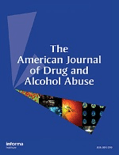
AMERICAN JOURNAL OF DRUG AND ALCOHOL ABUSE
Navigating the Intersection of Psychology and AddictionAmerican Journal of Drug and Alcohol Abuse is a highly regarded publication in the field of substance abuse research, published by Taylor & Francis Inc. With its inception in 1974, this journal has become an essential resource for scholars and practitioners interested in clinical psychology, psychiatry, and the multifaceted issues surrounding drug and alcohol use. It holds a notable Q2 ranking in Clinical Psychology, Medicine (miscellaneous), and Psychiatry and Mental Health, emphasizing its impact and relevance in these domains. The journal's 2023 Scopus rankings further highlight its standing, placing it in the top quartile of publications with established readership and citation metrics. Researchers and students can benefit from its comprehensive articles that delve into the complexities of substance use, treatment methodologies, and the socio-psychological underpinnings of addiction. Whether you seek to access cutting-edge studies or contribute to ongoing discourse in the field, the American Journal of Drug and Alcohol Abuse serves as a vital hub for knowledge dissemination and scholarly engagement.
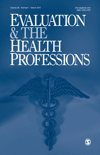
EVALUATION & THE HEALTH PROFESSIONS
Transforming health outcomes with evidence-based evaluation.EVALUATION & THE HEALTH PROFESSIONS is a pivotal peer-reviewed journal published by SAGE PUBLICATIONS INC, focusing on the intersection of evaluation methodologies and health policy practices. Established in 1978 and thoroughly indexed, this esteemed journal spans a rich history of scholarly contributions, with current research aimed at advancing knowledge in health services and evaluation science, making it essential for researchers, practitioners, and policy makers alike. With an impressive Scopus rank of #64 out of 310 in the Health Policy category and a notable 79th percentile ranking, the journal holds a significant position in its field, classified as Q2 in 2023. Although not open access, it provides a wealth of insights, aiming to amplify the understanding of evaluation impact on health practices. As the journal continues to evolve through 2024 and beyond, it remains a crucial resource for those invested in enhancing health outcomes through rigorous evaluation.
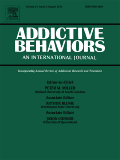
ADDICTIVE BEHAVIORS
Decoding the Science Behind Addictive BehaviorsADDICTIVE BEHAVIORS is a prestigious journal published by PERGAMON-ELSEVIER SCIENCE LTD, specializing in the critical examination and exploration of addiction-related issues across diverse fields including Clinical Psychology, Psychiatry and Mental Health, and Toxicology. With a robust history dating back to 1975 and convergence extending to 2024, the journal is esteemed for its rigorous peer-reviewed research that contributes significantly to understanding addiction phenomena. Ranked in the Q1 category for its focus areas, it stands out within the academic community, evidenced by its impressive Scopus rankings—25th in Clinical Psychology and 14th in Toxicology—placing it in the top tier of its disciplines. This journal offers valuable insights into addiction behaviors, treatment methodologies, and public health implications, making it an essential resource for researchers, practitioners, and students seeking to advance their knowledge and impact the field. Although not Open Access, it provides vital access options for institutions and individuals invested in addiction studies.

Substance Abuse Treatment Prevention and Policy
Innovative insights for effective prevention and policy.Substance Abuse Treatment, Prevention, and Policy is a premier open access journal published by BMC, dedicated to advancing the understanding and improvement of substance abuse treatment and prevention strategies. Since its inception in 2006, this journal has established itself as a significant resource in the fields of Health Policy and Psychiatry and Mental Health, proudly maintaining a strong reputation reflected in its 2023 Scopus rankings, which place it in the top quartiles of these categories. With an impactful focus on policy implications and evidence-based practices, the journal's comprehensive coverage supports the sharing of innovative research and perspectives aimed at mitigating substance abuse challenges worldwide. Open access since its launch, it ensures that vital research is readily available to researchers, practitioners, and students alike, facilitating collaboration and discourse in this critical area of public health. Its commitment to high-quality research is underscored by its rankings within the 78th percentile for Health Policy and 66th percentile for Psychiatry and Mental Health, highlighting its influence and relevance in addressing pressing issues in substance misuse.
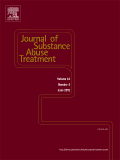
JOURNAL OF SUBSTANCE ABUSE TREATMENT
Innovating Approaches to Substance Abuse CareJOURNAL OF SUBSTANCE ABUSE TREATMENT, published by Pergamon-Elsevier Science Ltd, is a leading peer-reviewed journal that spans a wide range of topics related to substance abuse and addiction treatments. With an impressive impact factor, this esteemed journal ranks in the Q1 quartile across multiple disciplines including Clinical Psychology, Medicine (miscellaneous), and Psychiatry and Mental Health, making it a vital resource for researchers and practitioners alike. Covering convergence years from 1984 to 2023, it publishes cutting-edge research that informs treatment methodologies and policy development in the field of substance abuse. With access options that adapt to both traditional and modern academic needs, the journal seeks to advance the understanding and effectiveness of substance abuse treatment through comprehensive studies and innovative approaches. Be part of a global dialogue that shapes the future of addiction treatment by engaging with the latest findings and expert analyses that help bridge the gap between research and clinical practice.

JOURNAL OF BEHAVIORAL HEALTH SERVICES & RESEARCH
Innovating behavioral health through evidence-based practices.JOURNAL OF BEHAVIORAL HEALTH SERVICES & RESEARCH, published by Springer, is a premier peer-reviewed journal dedicated to advancing the scientific understanding of behavioral health services and their impact on individuals and communities. With its esteemed standing in the academic realm, as demonstrated by its Q1 ranking across multiple categories including Health Policy and Public Health in 2023, this journal offers vital insights into the intricacies of health service delivery, policy innovation, and the social determinants of health.
Since its inception in 1996, the journal has played a crucial role in disseminating high-quality research that addresses the evolving challenges in health services, and is uniquely positioned to contribute to the evidence-based advancements in this field through its valuable contributions and a growing repository of knowledge. Researchers, professionals, and students can benefit from both open access options and a subscription model to stay abreast of transformative trends and empirical evidence shaping behavioral health services.
As it continues to converge into the future, this journal remains a vital platform for those committed to enhancing the effectiveness of health services and promoting significant improvements in health outcomes across diverse populations.
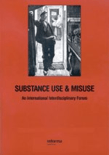
SUBSTANCE USE & MISUSE
Exploring the complexities of substance use for a healthier future.SUBSTANCE USE & MISUSE, published by Taylor & Francis Inc, is an esteemed academic journal dedicated to the multifaceted study of substance use and its implications on health and society. With a notable impact factor and categorized in the Q2 quartile across multiple fields—including Health (Social Science), Medicine (Miscellaneous), Psychiatry and Mental Health, as well as Public Health—this journal serves as an essential platform for researchers, professionals, and students alike. Spanning from 1966 to 2024, it provides a rich archive of peer-reviewed articles that explore current trends, innovative research, and evidence-based practices in the management and understanding of substance use. The journal offers various access options, catering to the diverse needs of its audience and affirming its commitment to fostering scholarly discourse in the United Kingdom and beyond. By engaging with this journal, readers can enhance their understanding of the complexities surrounding substance use, making it a crucial resource for advancing knowledge and informing policy in this critical area of public health.
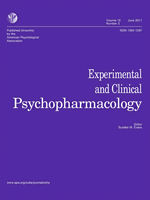
EXPERIMENTAL AND CLINICAL PSYCHOPHARMACOLOGY
Transforming Mental Health Through Evidence-Based InsightsEXPERIMENTAL AND CLINICAL PSYCHOPHARMACOLOGY, published by the American Psychological Association, stands as a pivotal resource within the fields of pharmacology and psychiatry. With an ISSN of 1064-1297 and an E-ISSN of 1936-2293, this journal contributes significantly to the understanding of psychopharmacological interventions through its rich array of research articles, reviews, and clinical studies. Classified within the Q2 category in both Pharmacology and Psychiatry and Mental Health, it reflects a solid standing in academic performance, evidenced by its rankings in Scopus, where it places within the top half of its categories. Spanning from 1993 to 2024, it seeks to provide an essential platform for the dissemination of knowledge and advancements that influence clinical practice and therapeutic approaches. Although not an open-access journal, its impact on the development of evidence-based psychopharmacological treatments cannot be overstated, making it a vital resource for researchers, clinically active professionals, and students eager to stay abreast of cutting-edge developments in mental health and pharmacology.

Current Addiction Reports
Advancing knowledge in addiction research.Current Addiction Reports, published by SPRINGERNATURE, is a leading journal dedicated to the comprehensive study of addiction in its various dimensions, with a particular focus on the latest clinical developments and research in Clinical Psychology and Psychiatry and Mental Health. Since its inception in 2014 and through to 2024, the journal has established itself as a pivotal resource for researchers, professionals, and students alike, currently holding a prestigious Q1 ranking in both relevant categories. With an impressive Scopus rank of #46 in Clinical Psychology and #129 in Psychiatry and Mental Health, it occupies a significant position within the field, reflecting its commitment to high-quality scholarship and impactful findings. The journal offers open access options, ensuring that vital research is readily available to a global audience. By fostering a deeper understanding of addiction trends and innovative treatment methodologies, Current Addiction Reports plays an essential role in advancing knowledge and improving clinical practices.

AIDS AND BEHAVIOR
Transforming knowledge into action against HIV/AIDS.AIDS AND BEHAVIOR, published by SPRINGER/PLENUM PUBLISHERS, is a leading scholarly journal dedicated to the interdisciplinary study of HIV/AIDS, focusing particularly on the behavioral aspects of the epidemic. With an impressive impact factor reflected in its Q1 rankings across key categories including Infectious Diseases, Public Health, and Social Psychology, this journal serves as a vital resource for researchers, clinicians, and public health professionals. It encompasses a wide scope of research, from the psychosocial factors influencing HIV transmission to innovative interventions that promote safe practices. Although it does not offer open access, the journal's rigorous peer-review process ensures the dissemination of high-quality, impactful research. Covering data from 1997 to 2024, AIDS AND BEHAVIOR is positioned at the forefront of advancements in the field, making it an essential addition to any academic library and a must-read for those involved in combating HIV/AIDS.